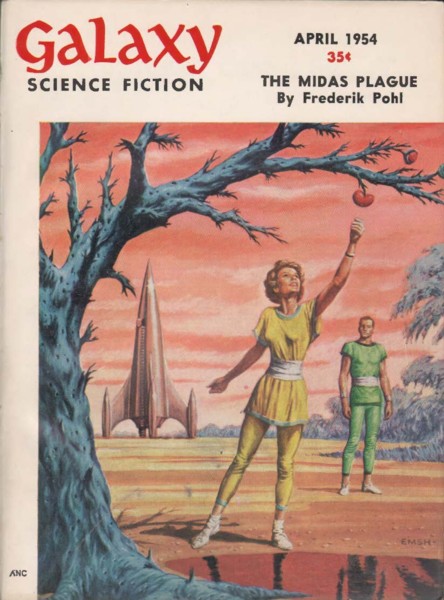
Originally appeared in H. L. Gold's Galaxy. Reprinted in several major retrospectives, by such editors as Arthur O. Lewis, Jr., Ben Bova, Gregory Fitz Gerald, Brian W. Aldiss, Kingsley Amis, Robert Conquest, Isaac Asimov, Martin H. Greenberg, Charles G. Waugh. Lester Del Rey selected it as one of Pohl's best.
Summary:
The "Midas" world is one where energy is so plentiful, that to be a good citizen means consuming more. The more one consumes, the higher one rises on the societal ladder. How does one consume ever more? If one cheats to get ahead, how does one hide their misdeeds? Surely, the evidence of their guilt
Commentary with Spoilers:
First, we should point out the famous fairy tale of Midas, who had the golden touch. Everything he touched turned to gold, making him very rich... until he touched his daughter, suggesting that greed may make us regret how it affects other parts of our lives.
Pohl takes this fairy tale and completely repurposes it. Note what the titles are for anthologies and collections it was reprinted in (he named two of them): American Utopias, Nightmare Age, The Case Against Tomorrow. Now some seem to suggest he does not mean the world he proposes, but the subtitle of Nightmare Age--"Tomorrows... we may be building today!" suggests that his aim seems utterly realistic. I also like that someone thought this deserved a place among utopias, not dystopias.
There's some truth here, but of course it's exaggerated for effect. The coolest thing about this short work is that what starts as a dystopia ends as a kind of utopia. It looks like doom for our hero who at first tries to make it through honesty and is forced by unsavory characters who trick his wife into forcing the couple into having to consume more. So he has to cheat, using robots to help him achieve this end. As he's hailed as a hero of consumption, the noose of his getting caught is cinching around his neck... until it turns out that they knew all along what he'd been doing and were impressed, starting to employ his techniques for consumption.
Absurd but strangely delightful. It's difficult to explain the metamorphic shift in storytelling as we learn we weren't living in the morality of the dystopia but a true if bizarre utopia. Little wonder it was listed as one of the great short works in the history of SF.

No comments:
Post a Comment